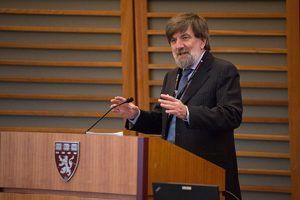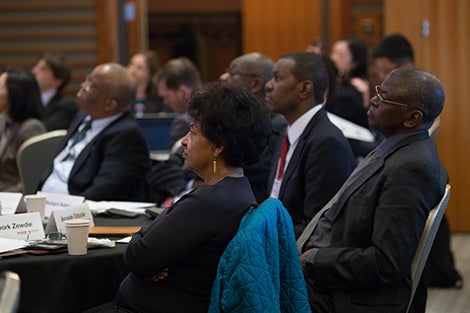June 23, 2016—Public health leaders from China and across Africa recently gathered in Boston, joining their counterparts from the Harvard T.H. Chan School of Public Health for the inaugural meeting of the newly established China-Harvard-Africa Network.
The vision for the Network, as outlined by Harvard Chan’s Wafaie Fawzi, is that it serve as a platform for convening scholars, experts, and policy leaders from Africa, China, and the United States to address issues of common interest; for conducting collaborative research; and for nurturing future generations of public health scholars, researchers, and leaders. Fawzi is the Richard Saltonstall Professor of Population Science; professor of nutrition, epidemiology, and global health; and chair of the Harvard Chan School Department of Global Health and Population.

“Friendship and partnership are the hallmarks of Harvard’s engagement with collaborators around the world,” said Fawzi during welcoming remarks. He noted that although the School has been engaged in partnerships in China and in several countries in Africa for many decades, combining the separate collaborations into a strong tripartite network will enhance the sharing of knowledge to improve health worldwide.
Reflecting the collaborative spirit, William Hsiao, the K.T. Li Research Professor of Economics in the Departments of Health Policy and Management and of Global Health and Population, encouraged the group to “loosen your ties so we can be friends rather than formal colleagues.”

During the opening session, David Hunter, Acting Dean of the Harvard Chan School, provided a historical overview of the School’s activities in China and Africa, from the early part of the 20th century to the present day. Providing context to the meeting, former Dean Barry Bloom, the Harvard University Distinguished Service Professor and Joan L. and Julius H. Jacobson Professor of Public Health, discussed two great challenges of the 21st century: the increasing disparities in quality of life between and within countries and the ability to harness the expanding knowledge of the life sciences in order to prevent and treat disease. Public health, said Bloom, is the fulcrum linking these global agendas; particular areas of concern include the unfinished agenda of infectious diseases, the coming epidemic of chronic diseases, disparities in health and social determinants, and issues facing health systems worldwide.

Participants in the three days of meetings of the fledgling China-Harvard-Africa Network included more than 30 public health leaders and senior representatives from Harvard and from universities in China and across Africa.
The promise of the Network lies in a shared vision, joint commitment, and collaborative efforts, noted Fawzi. “There was a time when U.S. universities traveled to China or to Africa to teach and instruct,” he said. “This time is long gone. Today we learn from each other. Today we are partners working to improve health in China, in Africa, and around the world.”
Photos: Sarah Sholes
